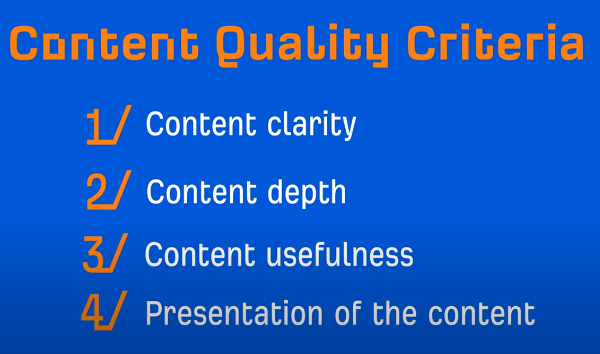It’s hard to impress me when it comes to content marketing tips, but a video I watched recently did just that.
The video was Ahref’s “How to Create Content that’s ‘Better’ than Your Competitor’s.” It’s a guide to growing traffic to your website by writing about topics your competitors have had success with — but doing it better.
The hardest part, host Sam Oh says, just might be defining “better.”
The video suggests evaluating content based on four factors: clarity, depth, usefulness and presentation.
Sam’s explanations and real-world examples for each factor are thorough and convincing. I’ll go into them — and add one factor I would add — but first, take a look at the video. It’s worth your time.
Here’s how Sam defines each of his content quality criteria:
Clarity: Is the content readable, and does it make difficult concepts easy to understand?
Depth: Does it answer the questions a reader probably has about the topic?
Usefulness: Does it help the user solve the problem that led them to the page?
Presentation: How does the content look on the page? (As Sam says, one shouldn’t judge a book by its cover, but users make judgements about web content all the time based on how attractively it’s presented.)
He recommends reviewing competitor content, grading it in each category listed above, and then creating content that outdoes it. For instance, if your competitor’s article rating protein shake recipes lacks depth, make sure your piece goes deep.
The factor I might add to Sam’s list is credibility. Good content does more than offer the reader advice, tips or insight — it also gives the reader reasons to trust what they’re reading. That’s credibility.
To be fair, Sam mentioned credibility at a couple points of the video, and you could argue that credibility is a key factor in content depth and usefulness. But it’s important enough to pull out as a fifth factor.
So, how do you add credibility to your content? Here are my suggestions:
1. Describe or Show Your First-Hand Experience
If you run a video production company and are blogging about editing techniques, embed some of your work as an example. If you’re an SEO company, show the metrics that prove your techniques work.

2. Include Research
If you can do your own research on your topic, that’s ideal. But if it’s not possible, use results of reputable surveys and studies to bolster your points. And don’t forget to link to your sources — that adds credibility, too.
3. Conduct an Interview
If you know an expert on your topic, get in touch and ask for their opinion. Even if you don’t know an expert, consider reaching out (social media is great for this) — their input will make your content more credible. You could also interview a client for a case study. You don’t have to arrange a lengthy Q&A — the process can be as simple as emailing a few questions to the expert.
4. Offer Opposing Viewpoints
With nearly any opinion or piece of advice, there is probably someone out there with a different point of view. If they’re reasonable and credible themselves, consider mentioning them and linking to their content.
Imagine you included these sentences in a piece: “While we believe this is the best advice for situation X, others have made good cases for trying a different approach. You can learn about them here …” Would that make your content more or less credible?
As Sam says in the video, creating high-quality content isn’t simple. But the rewards are worthwhile — more authority, greater trust and more search traffic. It’s great that Ahrefs advocates for doing content the right way.

